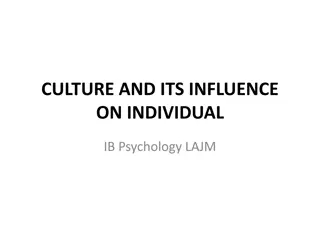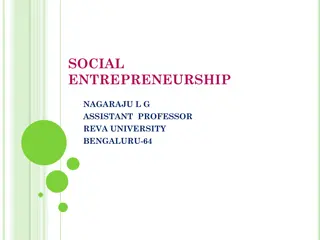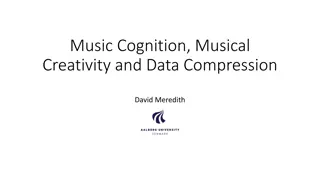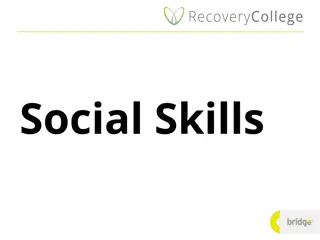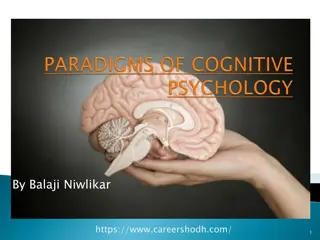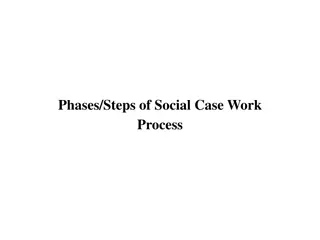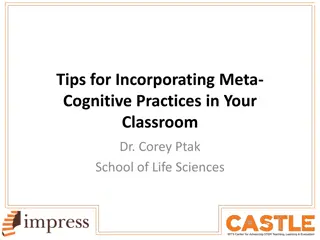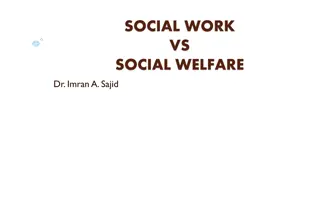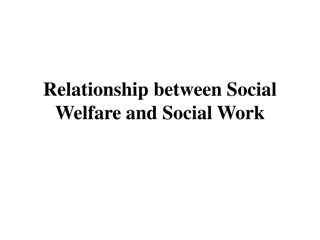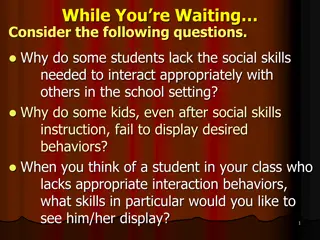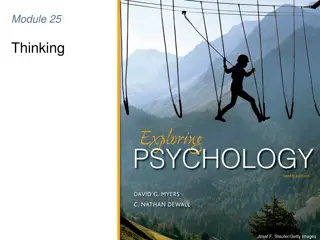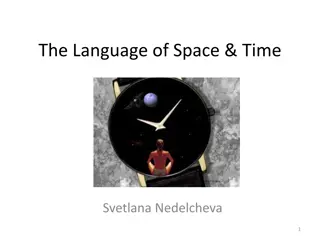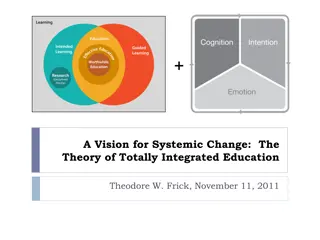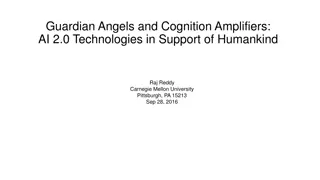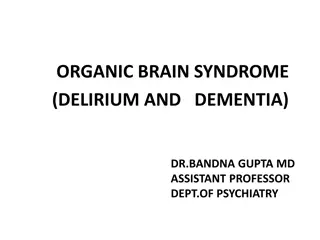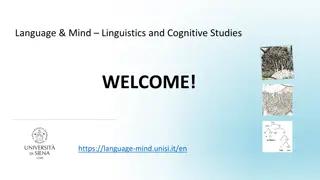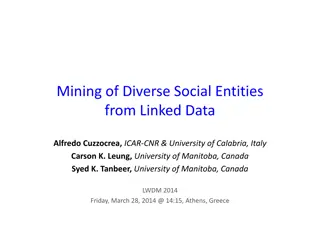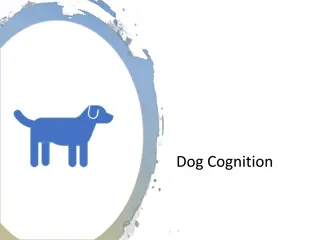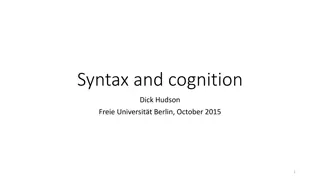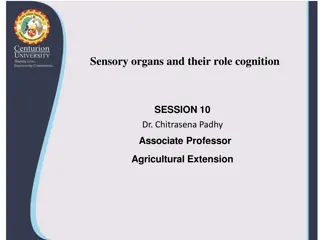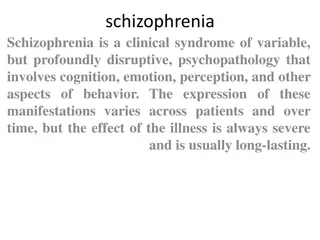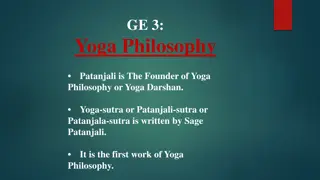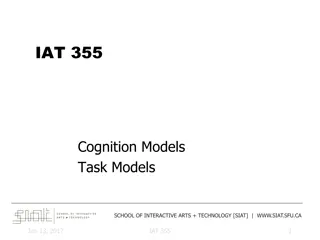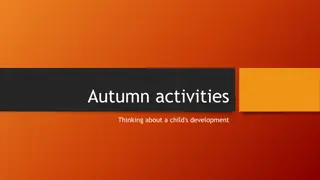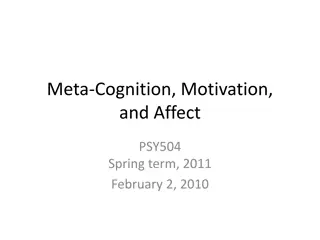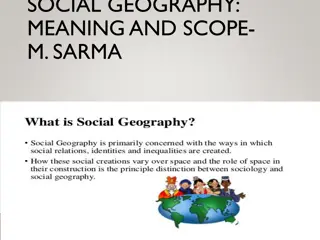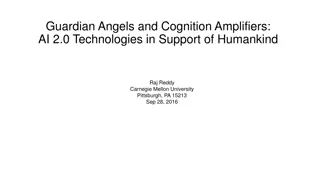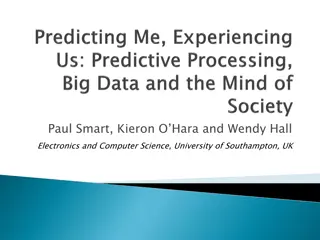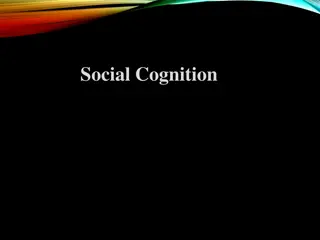Implicit Bias in Dance: Exploring Unconscious Beliefs and Behaviors
Explore implicit bias in the context of dance research through the lens of unconscious beliefs affecting judgments, behaviors, and social interactions. The discussion delves into the impact of implicit cognition on various aspects like self-esteem, social judgment, decision-making, and prejudice, hi
0 views • 16 slides
Understanding the Impact of Culture on Behavior and Cognition in IB Psychology
Explore the diverse facets of culture's influence on individual behavior and cognition in IB Psychology through topics like cultural origins, norms, and Hofstede's dimensions. Dive into mind mapping, textbook comparisons, and research studies to grasp the profound effects of culture on human psychol
2 views • 41 slides
Understanding Social Entrepreneurship, Social Enterprise, and Social Innovation
Social entrepreneurship involves creating sustainable social impact, social enterprises address challenges in critical needs sectors, and social innovation focuses on developing effective solutions to social and environmental issues. These concepts emphasize creating social value while engaging with
2 views • 19 slides
Understanding Personality Development: Social-Cognitive and Behavioral Perspectives
Social-cognitive theorists view personality development as influenced by the interaction between individual traits and social context, while behavioral theorists focus on learning effects. They relate by emphasizing behavior learning through conditioning and observation, alongside mental processes.
0 views • 19 slides
The Relationship Between Music, Cognition, and Data Compression
Music composition involves creating novel music for specific audiences. When we listen to music, our brain processes sound data through compression, seeking patterns and relationships to understand and appreciate the music better. This cognitive process is crucial for perception, cognition, and crea
0 views • 12 slides
Understanding the Importance of Social Skills for Mental Health Recovery
Social skills play a crucial role in how we communicate, interact, and form relationships with others. They are essential for personal, social, and professional success. Neglecting social skills can hinder mental health recovery, as they contribute to social recognition, acceptance, and building soc
2 views • 12 slides
Understanding Medical Social Work and Its Impact on Patient Well-being
Medical Social Work, also known as Health Care Social Work, plays a crucial role in addressing the social, physical, and psychological needs of patients. Through providing case work, after-care, and convalescence services, Medical Social Workers contribute to reducing hospital readmissions, preventi
0 views • 12 slides
Exploring Paradigms of Cognitive Psychology
Cognitive psychology, a branch of psychology, delves into mental processes like thinking, perceiving, remembering, and learning. This field views individuals as information processors, with paradigms guiding research methodologies. Key approaches include Information Processing, Connectionist, Evolut
0 views • 18 slides
Objectives and Importance of Social Legislation for Social Workers
Social legislation is inspired by the constitution and aims to remove discrimination, safeguard rights of vulnerable groups, and eradicate social evils. It plays a crucial role in social welfare by providing a legal basis for addressing societal issues, enhancing community well-being, and facilitati
0 views • 4 slides
Phases and Steps of Social Case Work Process
Social case work process involves three main phases: Social Study, Social Diagnosis, and Social Treatment. The Social Study phase focuses on acquiring facts about the client's situation, while Social Diagnosis involves the professional opinion of the case worker towards a solution. Social Treatment
0 views • 7 slides
Enhancing Learning Through Metacognitive Practices
Explore the significance of metacognition in education, including understanding metacognitive processes, knowledge of cognition, regulation of cognition, benefits for students, importance of self-reflection, and exercises that promote metacognition such as retrospectives and exam wrappers. Discover
0 views • 13 slides
Understanding the Difference Between Social Work and Social Welfare
Social work and social welfare are often used interchangeably, but there are distinct differences between the two. Social work involves highly trained professionals providing services to individuals and communities in need, using problem-solving methods. On the other hand, social welfare focuses on
0 views • 9 slides
Understanding the Relationship Between Social Welfare and Social Work
Social welfare and social work are interconnected concepts aimed at enhancing societal well-being. Social welfare refers to a nation's system of programs and services meeting essential needs, while social work involves professional activities supporting individuals and communities in achieving socia
0 views • 6 slides
Social Economy and Innovation in Emilia-Romagna Region
Emilia-Romagna Region in Italy highlights the importance of social economy and innovation for sustainable development. Various initiatives such as Social Cooperatives and Voluntary Associations contribute to the region's social well-being. The focus on social values and not-for-profit activities dri
1 views • 15 slides
Understanding Social Skills Development in Students
Explore the reasons behind students lacking social skills in school settings and analyze the challenges some face even after receiving social skills instruction. Discover the key social skills required for appropriate interactions and the importance of social competence for overall well-being. Delve
0 views • 64 slides
Understanding Cognition and Decision Making
Cognition encompasses mental activities like thinking, knowing, and remembering, while concepts simplify thinking by grouping similar objects. Cognitive strategies and obstacles in problem-solving, such as algorithms and confirmation bias, also play a crucial role. The "Aha!" moment reflects sudden
0 views • 15 slides
Exploring the Embodied Nature of Human Cognition
Exploring the concept of embodied cognition, this content delves into how human perception and understanding are shaped by physical experiences and interactions with the world. From spatial scenes to the containment concept, it highlights the fundamental role of the body in shaping our cognitive pro
0 views • 37 slides
Enhancing Education Through Totally Integrated Approach
Theodore W. Frick's Theory of Totally Integrated Education (TIE) emphasizes aligning student cognition, intention, and emotion with authentic learning tasks to create worthwhile education. TIE focuses on systemic change in education and provides a vision for improving learning outcomes by connecting
0 views • 55 slides
Guardian Angels and Cognition Amplifiers: Enhancing Human Intelligence with AI 2.0 Technologies
Harnessing the power of AI 2.0 technologies, Guardian Angels and Cognition Amplifiers (Gats and Cogs) augment human intelligence by continuously monitoring user activity patterns and intentions through smartphone sensors. These tools enable automation of daily activities, personalized assistance, an
0 views • 27 slides
Neuromorphic Computing: Bridging the Gap Between Silicon and Human Cognition
This research delves into neuromorphic computing, a cutting-edge field that merges principles from biology and silicon technology to advance cognitive processing. The study explores top-down approaches, drawing inspiration from the auditory cortex for DNS, and bottom-up strategies to enhance CPU arc
0 views • 17 slides
Understanding Social Neuroscience: Exploring Human Sociality and Well-Being
Social neuroscience delves into how the brain processes social interactions and their impact on human well-being. It focuses on the interconnectedness between social connections and overall life satisfaction, suggesting that humans are inherently social beings with a strong need for social belonging
2 views • 21 slides
Understanding Organic Brain Syndrome & Delirium
Overview of organic brain syndrome and delirium, including definitions, clinical features, and management. Delirium, a common psychiatric syndrome, affects consciousness, cognition, and perception, leading to increased morbidity and mortality. Recognize core symptoms, such as disturbances in conscio
0 views • 37 slides
Social Entrepreneurship and Social Inclusion in Bulgaria
The development and implementation of social entrepreneurship practices in Bulgaria aim to promote social inclusion through the development of the social economy. The focus is on combining economic results with social objectives, managed transparently with measurable, positive financial value. Vario
2 views • 12 slides
Master in Language and Mind: Interdisciplinary MA Program at University of Siena
The Master in Language and Mind is an interdisciplinary program focusing on language as a human cognitive capacity, offering two curricula in Linguistics and Cognition and Philosophy and Cognition, with opportunities for double degree programs and collaborations with international universities.
0 views • 21 slides
Diverse Social Entities Mining from Linked Data in Social Networks
This research focuses on mining diverse social entities from linked data in social networks using a DF-tree structure and DF-growth mining algorithm. The study explores the extraction of important linked data in social networks and the mining of various social entities such as friends. Prominence va
0 views • 13 slides
Dog Cognition: Understanding the Advanced Cognitive Abilities of Dogs
Exploring the fascinating realm of dog cognition reveals how dogs exhibit advanced cognitive abilities beyond that of many non-human primates. From social learning to strong discrimination learning, contingency reversal, and object manipulation, dogs showcase remarkable intelligence that continues t
0 views • 35 slides
Evolution of Syntactic Theory: From Psychology to Cognition
Syntactic theory has evolved significantly, influenced by psychology and cognition. The debate between phrase structure and dependency structure continues, with a shift towards integrating cognitive principles. Cognitive linguistics, including Cognitive Grammar and Construction Grammar, play a key r
0 views • 31 slides
Understanding the Role of Sensory Organs in Cognition
Leonardo da Vinci emphasized the significance of the five senses in experiencing life fully. Our sensory organs - sight, smell, hearing, touch, and taste - play vital roles in transmitting information to the brain for interpretation. Each sense has distinct functions essential for perceiving and und
0 views • 9 slides
Understanding Schizophrenia: Symptoms and Impact
Schizophrenia is a complex mental disorder characterized by disruptions in cognition, emotion, perception, and behavior. It manifests differently in individuals, with symptoms ranging from hallucinations and delusions to social withdrawal and blunted emotions. The illness can have severe and long-la
0 views • 38 slides
Understanding Yoga Philosophy: Insights from Patanjali's Yoga Sutra
Yoga philosophy, founded by Sage Patanjali, explores the union of mind and body through practices like Viveka and Cittavritti. The Yoga Sutra delves into stopping mental modifications and identifies five types of Cittavrittis. These include Pramana (valid knowledge), Viparyaya (false cognition), Vik
0 views • 26 slides
Cognition Models in InfoVis: Understanding Knowledge Creation Process
Visualization plays a key role in aiding cognition by supporting knowledge creation and seeking tasks through process models and task taxonomies. Understanding the cognitive aspects of information visualization is crucial for aiding comprehension and knowledge understanding, as demonstrated by the u
0 views • 41 slides
Early Learning Guidelines for Language, Literacy, and Cognition
Explore the developmental milestones in language, literacy, and cognition for children ages 0 to 5 through various standards and guidelines, including WA Early Learning Guidelines, Teaching Strategies Gold, Common Core State Standards, and more. Encourage play, storytelling, writing, and communicati
0 views • 6 slides
Understanding Child Development Through Autumn Activities
Explore how autumn activities can promote cognitive, physical, personal, social, and emotional development in children. Enhance cognition by offering opportunities for exploration and problem-solving with autumn items. Develop physical skills through nature walks to find leaves and other treasures.
0 views • 8 slides
Enhancing Understanding of Meta-Cognition, Motivation, and Affect in Psychology Classes
The content discusses survey responses and feedback on a psychology class focused on meta-cognition, motivation, and affect. Students shared insights on the best and worst parts of the discussions, highlighting the importance of staying on topic. The format of lectures followed by discussions was al
0 views • 53 slides
Evolution of Psychology between the World Wars
Rapid changes in psychology between World War I and World War II marked a shift towards the U.S., driven by economic, social, and educational factors. Barriers in psychology began to diminish, with more women entering the field despite obstacles. Notable figures like Lev Vygotsky and Jean Piaget rev
0 views • 17 slides
Understanding Social Geography: Meaning, Scope, and Differences
Social geography is a branch of human geography focusing on social structures, groups, and activities. It examines the spatial arrangement of social phenomena, social differences, and patterns in understanding socially defined population groups. The scope of social geography includes analyzing spati
0 views • 25 slides
Guardian Angels and Cognition Amplifiers: Transforming Human Intelligence with AI 2.0 Technologies
This explores the integration of AI technologies to enhance human cognition through the creation of personalized Guardian Angels (Gats) and Cognition Amplifiers (Cogs). These tools leverage multimodal sensors on smartphones to monitor activities, infer intentions, and automate daily tasks. The syste
0 views • 27 slides
Enhancing Senior Well-being through Social Services and Engaging Programs
Advocating for communities, the organization delivers social services for a dignified life. Meet the dedicated team, Noelia Salinas and Celia R. Garcia, leading efforts in supporting seniors through programs like BINGOCIZE. This evidence-based initiative combines exercise, nutrition, and falls preve
0 views • 10 slides
Understanding the Brain's Predictive Processing and Cognitive Architecture
Exploring the fascinating realm of brain function and cognition, this content delves into topics like deep learning systems, big data implications, the predictive nature of the brain, cortical hierarchy, active inference, generative models, and cognitive architectures explaining various mental condi
0 views • 21 slides
Understanding Social Cognition and Schemas
Social cognition explores how people perceive and interpret social information, using automatic and controlled thinking processes. Schemas are mental structures that help us organize knowledge about the social world, affecting how we remember, interpret, and act upon information. The self-confirming
0 views • 23 slides

